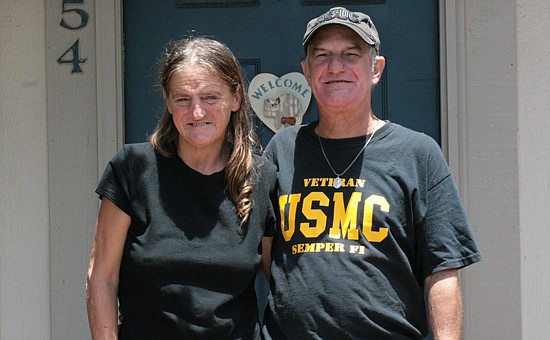- May 8, 2024
-
-
Loading

Loading

Three months ago, Dennis Sinns and his longtime girlfriend Rhonda Weaver were sharing a tent in the woods near Sanford. Three tents, actually. One was living space the couple shared with their rescued cat, Midnight; the other two stored their combined possessions.
Everything they had in the world, books to clothes to trinkets that they hoped would one day decorate a home, were carefully stored in those nylon shelters, protected by a shell a millimeter thick.
Today the couple shares a cozy one-bedroom apartment in Sanford thanks to the HUD-VASH, a new program dedicated to helping veterans like Sinns finally come home.
HUD –VASH stands for the Department of Housing and Urban Development – VA Supported Housing. According to program literature, “the target population for HUD-VASH is the vulnerable chronically homeless veteran who often has severe mental or physical health problems and/or substance use disorders.”
Under the program, veterans like Sinns are provided with case management services, health care through Veterans Affairs and permanent housing support.
Seminole County was recently awarded 15 new vouchers and Orange County 110, meaning an additional 125 veterans between the two counties will get the help they need to find permanent homes.
“We feel that [veterans] have done enough,” said Seminole County Housing Authority Executive Director Shannon Young. “We want to cut through the red tape and do all we can to make the process as easy as possible to get them in an apartment.”
Through the program, Sinns and Weaver were partnered with Lisa Goodwin, a VA social worker who Sinns enthusiastically describes as “one of the best.”
“She came every week and gave me inspiration and hope that this would actually happen,” Sinns said.
She stayed by their side throughout the entire process; helping them gather the needed paperwork, search for an apartment that would take them and their cat, and even helping them move when it came time.
“She was very respectful and intelligent.” said Sinns. “She really went out of her way to help us out.”
Sinns is a 10-year Marine veteran who served in far-flung places such as Vietnam, Cuba and Japan. His only regret, he said, was that he didn’t continue on to retirement with the military.
After years of off-and-on jobs, relationships and dangerous flirtations with drugs and alcohol, Sinns finally made it to a VA office at the prompting of a fellow veteran to figure out the source of his years of struggles.
It turned out the restlessness, anxiety and recurring anger he had experienced over the years were the result of undiagnosed post-traumatic stress disorder, a psychiatric condition common to soldiers exposed to conflict.
Sinns has suffered more than his fair share of internal and external conflicts, both in and out of uniform.
His first marriage failed while he was still a Marine, due in part to his long deployments. The loss of his second wife in a tragic accident sent him into a tailspin that resulted in the loss of his job and eventually his home.
Following a destructive cycle of job loss and substance abuse, Sinns ended up virtually homeless, living in storage sheds, on friends’ couches, in tents and sometimes in a travel van that he owned, always on the lookout for “good woods” to camp in.
Good woods, he said, being “safe-ish” places that no one else had already camped in, and preferably near a convenience store.
Different locations led Sinns and Weaver to make friends with the storeowners, and often pick up odd jobs for a little extra cash.
Even after being shot at in their camp one day, it was still difficult for the couple to leave their compound in the woods.
As Sinns says, his psychiatrist “bugged him” for two years to get more help, but he always declined, fearing what would happen to Weaver, his girlfriend of eight years, if he were to leave her behind to seek individual help through the VA.
But caseworkers were persistent and earlier this year a social worker at the VA was finally able to convince him that they would be able to help both him and his girlfriend through the HUD-VASH program.
After searching for just the right place with the help of their caseworker, Goodwin, the couple settled in a one-bedroom apartment in May, not too far from the site of their former camp.
Together the couple have finally unpacked the treasures they had been saving for just such a day.
On one wall of their new Sanford home, there’s a built-in bookcase. On one side Sinns’ books are proudly displayed, on the other Weaver has artfully arranged figurines and collectables the couple gathered during their life together.
In the center section, Sinns set up a shrine to his fellow soldiers, complete with miniature American flags he got at veterans rallies, an eagle figurine and mementos of his days as a Marine.
Each piece is a reminder of the long journey to this place they can finally call home.
After five years in the woods, Sinns can now sit down on his own sofa to read his books and no longer has to worry whether his things will still be there when he returns.
“I looked like Santa back then,” Sinns says of his days in the woods. “Except not the kind that kids would go see,” he said with a chuckle.
Today he looks proud; glancing over the home he shares with Weaver, their cat Midnight, and the latest addition, a kitten named Whiskers.
“This is a great program,” Sinns said. “The best I’ve ever dealt with through the VA.”
“I can’t thank them enough, especially Lisa, for getting us this far.”
Sinns still has a few obstacles to overcome, such as dealing with a recurring foot problem and finding a job, but the optimism in his tone says he’s prepared to face them.
“Life is looking up, everyday things seem better and better.”